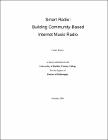Browsing Computer Science (PhD Theses) by Date of Publication
Now showing items 1-20 of 290
-
Perceptually-Adaptive Collision Detection for Real-time Computer Animation
(Unversity of Dublin, Trinity College Dublin. Department of Computer Science, 1999)The aim of interactive animation systems is to create an exciting and real experience for viewers, to give them a feeling of immersion, of "being there". The tendency in the past has been to attempt to achieve this by ... -
Neural network ensembles for financial time-series prediction and risk management
(Trinity College (Dublin, Ireland). School of Computer Science & Statistics, 2000)Neural Network Ensembles for Financial Time-Series Prediction and Risk Management. Recently, neural networks have become popular tools for modelling financial markets. Much of this popularity can be attributed to the fact ... -
Database Sampling to Support the Development of Data-Intensive Applications
(University of Dublin, Trinity College. Department of Computer Science, 2000-10)A prototype database is a model of a database which exhibits the desired properties, in terms of its schema and/or data values, of an operational database. Database prototyping has been proposed as a technique to support ... -
Multi-Party Electronic Payments for Mobile Communications
(University of Dublin, Trinity College. Department of Computer Science, 2000-10)As mobile communications become increasingly sophisticated and ubiquitous, traditional mobile billing with its implicit trust relationships will no longer be adequate. With a large number of different sized mobile networks, ... -
PAM-AID - A study in human-machine cooperative behaviour
(Trinity College (Dublin, Ireland). School of Computer Science & Statistics, 2001)The research described in this thesis attempts to address the needs of a growing number of people with both a visual impairment and a mobility impairment. These people tend to live a very inactive lifestyle, often confined ... -
Automated application of design patterns : a refactoring approach
(Trinity College (Dublin, Ireland). School of Computer Science & Statistics, 2001)Software systems have to be flexible in order to cope with evolving requirements. However, since it is impossible to predict with certainty what future requirements will emerge, it is also impossible to determine exactly ... -
Hybrid feature-based transform coding of grey-level images
(Trinity College (Dublin, Ireland). School of Computer Science & Statistics, 2001)The objective of image compression is to achieve the minimum possible bit-rate, within certain bounds of computational complexity, and with a tolerable degree of distortion. In very low bit-rate coding it is generally ... -
Monte Carlo simulation for global illumination
(Trinity College (Dublin, Ireland). School of Computer Science & Statistics, 2001)The aim of global illumination is to produce a realistic image that is indistinguishable from a real image of that scene in the least amount of time. This is achieved by modelling the physical laws that govern light ... -
Bounding volume hierarchies for level-of-detail collision handling
(Trinity College (Dublin, Ireland). School of Computer Science & Statistics, 2002)Enforcing solidity of objects within simulations is a major computational overhead. Detecting interactions between bodies is a large part of this overhead. Many researchers have used hybrid collision detection algorithms ... -
Supporting meta-types in a compiled, reflective programming language
(Trinity College (Dublin, Ireland). School of Computer Science & Statistics, 2002)Software engineering in a distributed, heterogeneous environment is faced with a number of challenges. With distribution comes the need for synchronisation, transactions, and fault-tolerance while support for different ... -
Unified pattern recognition and its application to handwriting recognition
(Trinity College (Dublin, Ireland). School of Computer Science & Statistics, 2002)The goal of this thesis is the design and the implementation of a visual pattern recognition system based on the analysis of fundamental principles of human perception. The system must simultaneously be psychologically ... -
A flexible framework for distributed shared objects
(Trinity College (Dublin, Ireland). School of Computer Science & Statistics, 2002)A distributed shared memory (DSM) system ensures the consistency of shared data in a distributed system while providing the programming paradigm of a single-processor system. Recent DSM systems provide increasingly more ... -
A holistic approach to mobile robot navigation using omnidirectional vision
(Trinity College (Dublin, Ireland). School of Computer Science & Statistics, 2002)This dissertation presents a novel methodology for vision-based robot navigation. One of the key observations is that navigation systems should be designed through a holistic approach, encompassing aspects of sensor design, ... -
Adaptive levels of detail for interactive Collision Handling
(Trinity College (Dublin, Ireland). School of Computer Science & Statistics, 2003)Collision Handling has long been a major bottleneck in physically based animation. As scene complexity increases the problem becomes critical enough to prohibit real-time performance in the animation system. Previous ... -
Aggregating case-based reasoners in ensembles : an approach in support of explanation
(Trinity College (Dublin, Ireland). School of Computer Science & Statistics, 2003)Among the reasons for the success Case-Based Reasoning (CBR) has achieved in tackling supervised learning problems, is certainly the capability to give a ranking to any case stored in the database depending on its similarity ... -
Explaining the output of ensembles on a case by case basis
(Trinity College (Dublin, Ireland). School of Computer Science & Statistics, 2003)This thesis introduces a novel method for explaining the predictions of ensembles of artificial neural networks on a case by case basis. Current research is primarily directed towards building global model, that is, models ... -
Event-Based Middleware for Collaborative Ad Hoc Applications
(University of Dublin, Trinity College. Department of Computer Science, 2003-09)Middleware supporting event-based communication is widely recognised as being well suited to interconnecting the components of mobile applications since it naturally accommodates a dynamically changing population of ... -
Supporting Mobile Computing in Object-Oriented Middleware Architectures
(University of Dublin, Trinity College. Department of Computer Science, 2003-10)The distributed object paradigm is now widely accepted as a suitable abstraction for building distributed applications. Numerous system architectures based on the paradigm have been proposed, and software frameworks ... -
Smart Radio: Building Community-Based Internet Music Radio
(University of Dublin, Trinity College. Department of Computer Science, 2003-10)The success of file-sharing networks demonstrates that there is a huge potential market for digital music services, if the music industry can find a service model that is attractive to listeners. The concept of digital ... -
Towards a formal method for distributed object-oriented systems
(Trinity College (Dublin, Ireland). School of Computer Science & Statistics, 2004)We present two components of a special purpose formal method intended to support the modelling and development of distributed object-oriented systems. The first component is a language, called Oompa, in which designs for ...























